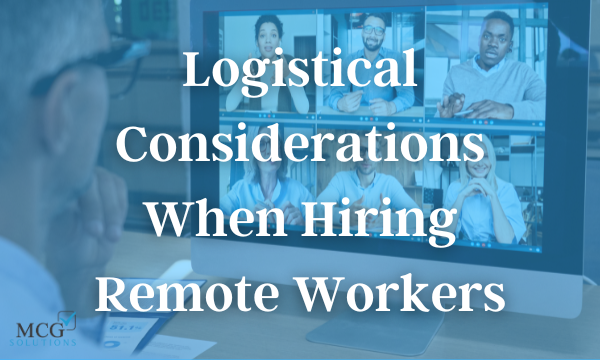In recent years, remote work has gained popularity. Businesses now have the opportunity to tap into a global talent pool—even small businesses. While hiring remote workers can be a strategic move, navigating the logistical challenges can be tough.
Legal and tax logistics
When hiring remote workers from different states, familiarize yourself with the employment laws and payroll tax regulations. Employment laws vary from one state to another. This impacts issues like minimum wage, benefits, overtime and workers’ rights. Similarly, tax requirements may differ, which affects your payroll processing and tax obligations.
As you’re getting ready to hire, consider working with legal counsel or a knowledgeable HR professional to ensure compliance with state and federal laws. There may be simple solutions to these issues. For example, some payroll software can automatically calculate and withhold taxes based on the worker’s location.
Another option is to hire remote workers through agencies or outsourcing firms. These agencies often have the expertise to navigate the complexities of employment laws and tax regulations. By using their services, you can ensure that your remote workers are properly classified as contractors, relieving you of some legal and tax responsibilities.
Finally, hiring outside help can lessen the burden. Human resources and bookkeeping firms can provide guidance on legal compliance, tax implications, payroll tax management and other HR-or budget-related matters. Outsourcing these tasks allows owners to focus on their own areas of expertise.
Setting expectations
Writing a job description is a helpful way to explain what you’ll require of the employee—and what hiring a remote worker will require from your company and budget.
- Employee role: Clearly define the role and its parameters. For example, specify whether there are set working hours or flexible schedules. Outline your expectations regarding attendance, whether it’s a hybrid role or fully remote.
- Tools and equipment: Think about the tools and equipment necessary for the remote worker to perform their job. This may include company-provided electronics, specialized software or access to certain resources like company-wide Dropbox or Google Drive repositories. You’ll need to include these in your budget, too.
- Travel requirements: If the role involves travel, whether to your “home base” or otherwise, be transparent about your expectations. It’s important to plan and budget for those trips ahead of time, to ensure that your company’s projected revenue can cover the costs.
Creating a budget
By now, you should thoroughly understand all the costs associated with hiring and maintaining a
remote worker. This includes salaries, benefits (if applicable), equipment, software licenses and
any compliance-related expenses.
You’ll need a detailed budget that accounts for all these costs. Collaborate with your bookkeeper
to make sure you’ve covered your financial obligations when bringing on remote talent. Once the
budget is set, assess your cash flow to ensure you have the resources to cover these expenses.
Remote workers should not strain your company’s financial stability—if they do, look for
sources of extra funding, or make adjustments to fit your company’s needs.
By understanding employment laws, setting clear expectations and budgeting effectively, you
can bring on top talent, no matter where they live. MCG Solutions is available to help you
navigate hiring remote workers. Call today to get started.

